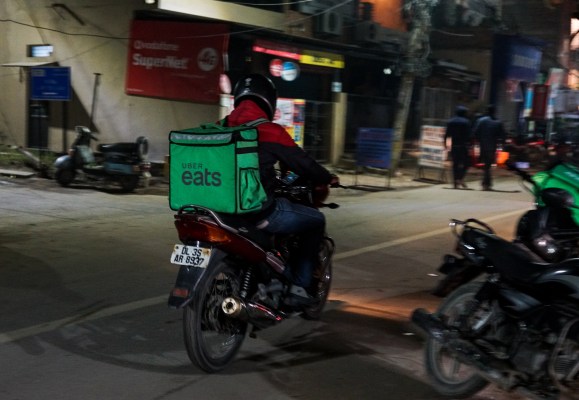Now that 2020 has started, Uber, DoorDash and Lyft are taking additional steps to undermine a new California law that would help more gig workers qualify as full-time employees. These moves entail product changes, lawsuits and ramped-up efforts to get a ballot initiative in front of voters that would roll back the new legislation.
Let’s start with the most recent development; yesterday, Uber sent a note to users announcing that it’s getting rid of upfront pricing in favor of estimated prices, unless they’re Uber Pool rides.
“Due to a new state law, we are making some changes to help ensure that Uber remains a dependable source of flexible work for California drivers,” Uber wrote in an email to customers. “These changes may take some getting used to, but our goal is to keep Uber available to as many qualified drivers as possible, without restricting the number of drivers who can work at a given time.”
Uber says it also has to discontinue rewards benefits like price protection on a route and flexible cancellations for trips in California. For drivers, that means they won’t see estimated earnings and drivers in surge arteas will no longer see fixed dollar amounts.
“AB5 threatens to restrict or eliminate opportunities for independent workers across a wide spectrum of industries, including trucking, freelance journalism and ridesharing,” an Uber spokesperson told TechCrunch. “As a result of AB5, we’ve made a number of product changes to preserve flexible work for tens of thousands of California drivers. At the same time, we’ve put forward a progressive package of new protections for drivers, including guaranteed minimum earnings and benefits, so voters can choose to truly improve flexible work in November.”
While Uber is essentially saying this is something the company must do, it’s worth noting that this is not some requirement of the new law; this is Uber’s attempt to beef up its case that it’s legally allowed to classify drivers as independent contractors. Since much of the rationale for determining whether or not a worker is an employee comes down to control, removing upfront fares and ditching penalties for rejecting fares could help Uber make a case that its drivers are operating on their own accord.
Meanwhile, the Coalition of App-Based Drivers — backed by Uber, Lyft and DoorDash — is starting to collect signatures for its ballot initiative. Called the Protect App-Based Drivers & Services Act, the measure aims to ensure drivers and couriers can continue to be independent contractors with flexible work hours.
The ballot measure looks to implement an earnings guarantee of at least 120% of minimum wage while on the job, 30 cents per mile for expenses, a healthcare stipend, occupational accident insurance for on-the-job injuries, protection against discrimination and sexual harassment and automobile accident and liability insurance.
In order for this to make its way onto the ballot, the group must collect 623,212 signatures. Right now, the Coalition says more than 27,000 drivers support the initiative and “expects to collect well in excess” of the signatures required to qualify for the ballot.
“I work full-time as a cook at a homeless shelter and drive rideshare when it’s convenient for me,” Lyft driver Lorraine Hanks said in a statement. “This ballot measure would protect my ability to make this extra income I need on my terms. Recent legislation could threaten this flexible way to earn money by forcing me to become an employee — which doesn’t work for me. I’m excited to sign the petition, spread the word to all my passengers and do whatever I can to make sure we pass this in November.”
As with any ballot initiative, there are those who strongly oppose it. Gig Workers Rising, a collective of gig workers that advocated for the passage of AB5, as well as other workers, are gearing up to combat these efforts. As Instacart worker-activist Vanessa Bain previously told me:
This year is going to be a very turbulent and intense one. I think in a lot of really good and a lot of really bad ways. I think it’s going to be a square off between workers and corporations, and seeing who really holds the power and who is really the best at persuading public opinion.
It’s not a level playing field: Uber, Lyft and DoorDash have millions of dollars to throw toward this initiative, along with the ability to send alerts in favor of the measure to drivers and passengers with the push of a button.
In the event that the measure doesn’t become law, there’s no doubt that Uber and other gig economy companies will take additional steps to convince legislators that they are legally classifying drivers as independent contractors. That could mean additional product changes that further remove some of the predictability from the service. Last year, as AB5 was just a signature away from becoming law, Uber Chief Legal Officer Tony West warned that employee status for drivers would mean they would not be able to determine when, where and how often they work, nor would they be able to work for more than one platform at a time.
On top of this, Uber and Postmates closed out the year with a lawsuit calling AB5 unconstitutional. The lawsuit argues AB5 violates a number of clauses in the U.S. Constitution, including the Equal Protection Clause.
Just so we’re all clear, tech companies are vehemently against classifying drivers and delivery people as employees because of the cost. It’s not clear exactly what that fiscal impact would be, but industry analysts have estimated the shift in worker classification could result in up to a 30% cost increase.
Of course, tech companies are not the only ones opposed to the new law; several organizations representing freelance writers filed a lawsuit in federal court in Los Angeles that alleges the new law restricts free speech. That came after Vox Media announced it would cut hundreds of freelance positions in California in anticipation of the new law.
